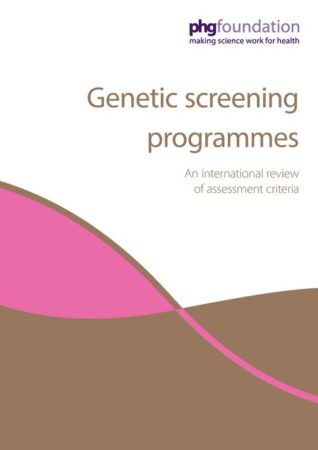Home Publications Reports Genetic screening programmes: an international review of assessment criteria
Genetic screening programmes: an international review of assessment criteria
As part of the National Screening Committee’s (NSC) triennial review of its processes, and in light of evolving applications of genetic technologies, the PHG Foundation undertook a literature review to identify international criteria for appraising genetic screening programmes and to set out the relevant ethical, legal and social (ELS) issues.
What we did
- Described criteria for appraising genetic screening used by other countries, or proposed in the literature, and compared them with those used by the NSC
- Set out relevant ethical, legal and social issues which inform the appraisal of genetic screening programmes
- Made recommendations to the UK NSC Review Committee, based on our research, relating to key issues including the scope of genetic screening that falls under its remit and the suitability of the existing screening criteria for appraising genetic screening programmes
What we found
In our report we highlight the particular difficulties in meeting the existing criteria faced by those proposing a screening programme for rare disorders, where no associated intervention is available or where screening may be used for information giving, such as to inform reproductive choice in antenatal or preconception screening.
Impact
Based on our report’s recommendations, alongside those from a University of Warwick report and responses to a public consultation exercise, the committee concluded that the current criteria were robust but a few small changes were recommended to reflect the complexity of appraising genetic screening programmes. These included:
- In relation to the condition, the importance of the health problem should be judged not just by its fequency, but also its severity, which is important in assessing screening programmes for rare diseases
- In relation to the effectiveness of the screening programme, where available, evidence of the wider benefits of screening for family members should be taken into account, which is of particular relevance to genetic screening programmes
By Louise Cameron and Hilary Burton

